|
Nineteenth
century woodworking shops joined
Sorting Goods companies to meet the
growing demand for baseball bats.
Some, like J. F. Hillerich & Son
were successful. Others, such as
horse and buggy manufactures, made
baseball bats to supplement their
business during changing times.
This
L. R. & Co. Ring baseball bat
belonged to a family living in
Huntley, Illinois 6 miles west of
Chicago. In 1911, Grandpa used to
drive the Huntley baseball team to
their games in his large Thomas B.
Jeffery vehicle. The automobile
manufacturer produced cars from
1902 until 1916.
|
|
| |
 |
|
| |
The origin and
manufacturer of this 19th century era
ring bat is in question. The only L. R.
& Co. in the area was a clothing store
based in Columbus, Indiana, about 220
miles from Chicago Illinois, where
company founder Lee Rosenbush resided.
Back in the day, it was common for
clothiers to give away a baseball bat
with the purchase of a suit, pair of
shoes, etc... With no Manufacturer or
business location branded on the bat,
it is likely that this bat was used as
a premium.
A. C. McClurg was a stationer, publisher, and book wholesaler for over 120
years in Chicago, Illinois. McClurg
became senior partner in 1887 and the
company took the name of A. C. McClurg
& Co. Under McClurg, the company became
one of the leading book distributors
and publishers in the nation, and soon
added numerous other lines to its
wholesale catalog including sporting
goods. By 1923, McClurg become a
strictly wholesale house, even selling
its flagship downtown Chicago bookstore
to Brentano's.
|
|
| |
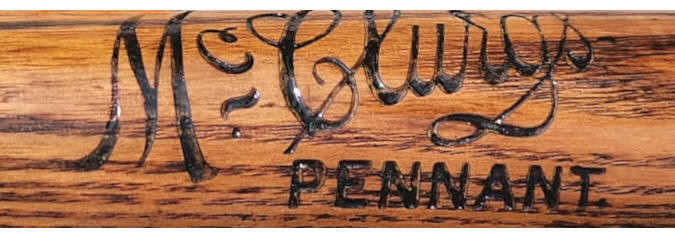 |
|
| |
The
McClurg's line of baseball bats
were produced from about the
1890s-1911. Models include: McClurg's
Winner Ring Bat; McClurg's Pennant;
McClurg's Champion, and McClurg's
McClurg's Selected. The Pennant and
Selected models were also produced with
a mushroom knob. The mushroom knob was
patented by Spalding in 1903, and were
common until about 1911. The Ring bats
were common to the 1890s.
The name Brendamour had been associated with the sporting goods business
since 1902 when the firm of Roll,
Crawford and Brendamour was founded.
Businessman Edward Brendamour and
partners opened a sports and motorcycle
store on Fifth Street in downtown
Cincinnati. The store, Roll-Crawford
and Brendamour, later moved to Sixth
Street. |
|
| |
 |
|
| |
Its Sixth Street store, at
17,000 square feet, was one of the
largest in the country. Only a few
Roll-Crawford and Brendamour baseball
bats survived to this day. The bats
have a mushroom knob, and the branding
reads: "The Roll-Crawford-Brendamour
Cincinnati., No 1, Nox-All"
The
Giants Special No. G100 baseball bats
were given away free, with every pair
of Bull Dog suspenders purchased from
Cadmus Men's Shop, at 296 Main Avenue
in Passaic, NJ. The store promotion was
held from October 7 to October 11,
1913, coinciding with the 1913 World
Series between the Philadelphia
Athletics and New York Giants. |
|
| |
 |
|
| |
The stores window display was
artistically dressed with the famous
Bull Dog suspenders and the Giants No.
G100 baseball bats. Obviously a Giants
fan, the owner of the shop, John
Cadmus, also posted the scores by
innings. The Athletics won the series
four games to one.
The Schmelzer Arms Company was founded in 1857 by John F. Schmelzer
in Leavenworth, Kansas. The company was
a manufacturer of firearms, and as time
went on became Importers and Dealers in
Guns, Fishing Tackle, Baseball, Tennis
Goods, Bicycles And Sporting Goods. |
|
| |
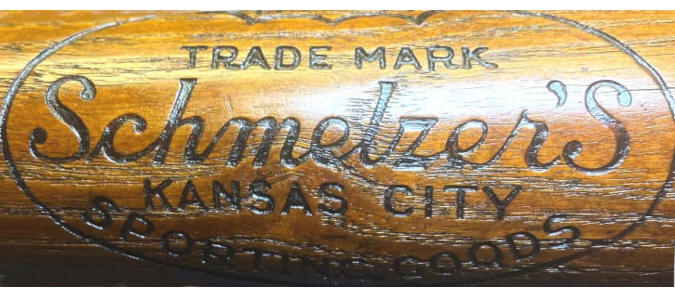
|
|
| |
The 1920's saw a steady decline
in sales and in 1930, filed for
bankruptcy. George Lowe who was an
employee and worked as a buyer for Schmelzers during
their heyday in the teens, stepped
forward during the bankruptcy and took
over some of Schemlzer's sporting goods
business for his present company, Lowe
and Campbell Sporting Goods.
The McCarthy-Morris Co. was
located at 309 Washington St., Boston
MA. The sporting Goods company carried,
and distributed a complete line of
athletic equipment for Baseball;
basketball; football; hockey; golf;
tennis; track and boxing. They were
athletic outfitters to Boston college,
Harvard University, and also supplied
uniforms and equipment for the Boston
Bruins.
|
|
| |
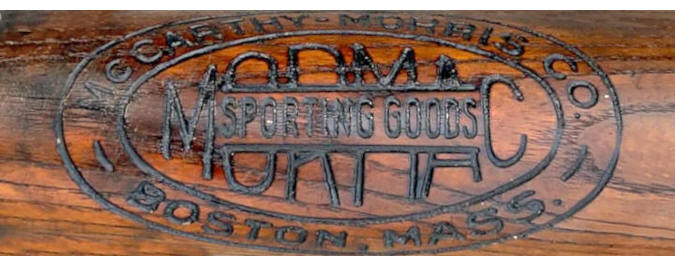 |
|
| |
The
McCarthy-Morris Company
distributed Mormac Inc. sporting goods.
Baseball bat last name block letter
endorsement models included: Mormac
Special Foxx Style; Mormac Special
Gehrig Style; Mormac Special Bottomley
Style; Mormac Special Simmons Style,
Klein Special, and the 400 model.
The
L.H. Kurtz Hardware Co. was founded
by Louis Henry Kurtz in 1866 at Third
and Walnut streets, in Des Moines,
Iowa. A German immigrant, he sold
hardware and worked as a tinsmith,
making pots, pans and stovepipes. In
the following decades, Kurtz Hardware
evolved, adding housewares and sporting
goods to their catalog. |
|
| |
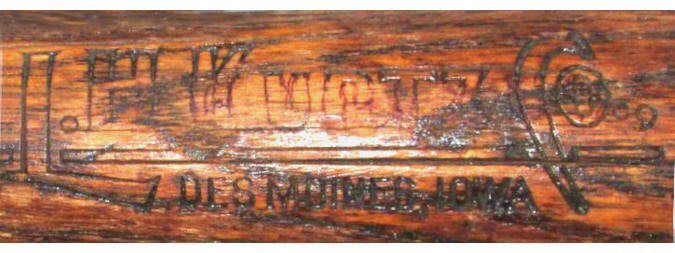 |
|
| |
Kurtz Hardware sold and distributed
sporting good made by all the major
brands. Their catalog Included,
Winchester shotguns; Wilson golf clubs;
Goldsmith uniforms, baseballs, gloves
and Louisville Slugger baseball bats.
This "L.H. Kutrz Co., Des Moines, Iowa"
- Model No. 260 (branded on the barrel)
baseball bat is the only known example.
It features the "L.H. Kurtz Co."
trademark branding with Des Moines,
Iowa" below.
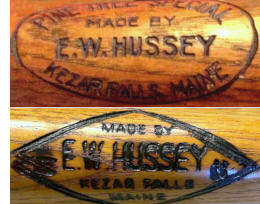 Ernest W. Hussey made baseball bats
since the 1930s. His early connection
with the business was when he started
buying stock for Billy Mains, the
well-known major league pitcher who
came up with the Chicago White
Stockings in 1888.
Ernest W. Hussey made baseball bats
since the 1930s. His early connection
with the business was when he started
buying stock for Billy Mains, the
well-known major league pitcher who
came up with the Chicago White
Stockings in 1888.
Mains operated his business at Sandy Creek Bridgton. After Mains' death in
1923, Hussey manufactured bats at the
Sandy Creek shop for a short time, then
set up shop at his Parsonsfield farm.
The workshop which was set up in his
home near Kezar Falls, Hussey turned
out many hundreds of bats and many
dollars worth of orders.
He and his son Willard Hussey provided bat for schools, and camps
throughout Maine and other New England
States.
They produced three distinct types of
bats. The "Hussey's Home Run" -
"Hussey's Pine Tree," with an oval
branding, and bat with the diamond
branding pictured above, bearing the
"Made By E.W. Hussey, Kezar Falls,
Maine."
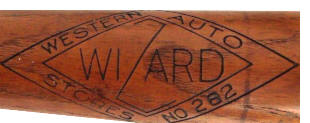 Western Auto Supply Company—known more
widely as Western Auto—was a specialty
retail chain of stores that supplied
automobile parts and accessories.
Western Auto primarily sold products
under their own private labels,
including tires, batteries,
electronics, appliances, and tools.
Western Auto issued
baseball bats with the "Wizard"
branding around 1947.
Western Auto Supply Company—known more
widely as Western Auto—was a specialty
retail chain of stores that supplied
automobile parts and accessories.
Western Auto primarily sold products
under their own private labels,
including tires, batteries,
electronics, appliances, and tools.
Western Auto issued
baseball bats with the "Wizard"
branding around 1947.
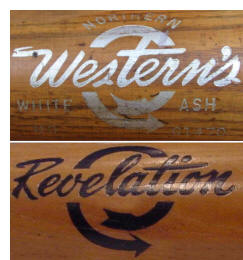 From about 1948 to 1956, baseballs,
baseball gloves and bats featured the
"Western's" Western Auto circle arrow
logo. "Western's" brand block
letter player endorsed baseball bats
included: Babe Ruth, Hank Greenberg
Rogers Hornsby.
From about 1948 to 1956, baseballs,
baseball gloves and bats featured the
"Western's" Western Auto circle arrow
logo. "Western's" brand block
letter player endorsed baseball bats
included: Babe Ruth, Hank Greenberg
Rogers Hornsby.
From 1956 through to the 1980s, Western Auto Associate Stores sold
Sporting goods under the
private
"Revelation" label, which at first
featured the western Auto circle arrow.
In 1965 the circle arrow was removed,
leaving just the word "Revelation" with
a stitched baseball behind it.
Pre 1965 Revelation Circle Arrow brand block letter player endorsed
baseball bats include: Yogi Berra
Model, Pee Wee Reese Model, Ted
Kluszewski Model, Kell Type, and Kaline
Type. |
|
| |
 |
|
| |
Post 1965 Revelation® brand
block letter player endorsed baseball
bats include: Jackie Robinson, Rod
Carew, Mickey Mantle, Brooks Robinson,
Norm Cash, Henry Aaron, Roger Maris -
Roberto Clemente Little League, Frank
Robinson Little League, and Pete Rose
Little League.
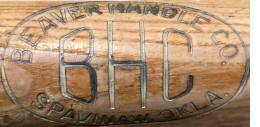 The Beaver Handle Company started in
Topsy Oklahoma in 1942, by G. E. "Ed'
Willhite, who also operated a general
store there with his sons. The
Willhites produced about $60,000 worth
of handles and baseball bats annually from 1942
to 1955.
The Beaver Handle Company started in
Topsy Oklahoma in 1942, by G. E. "Ed'
Willhite, who also operated a general
store there with his sons. The
Willhites produced about $60,000 worth
of handles and baseball bats annually from 1942
to 1955.
G E Willhite, founder of the business, moved near Topsy in 1942 after
operating a small handle factory in
Beaver, Arkansas beginning in 1935.
In an effort to keep off the federal
government's relief rolls during the
Great Depression, Willhite started
making axe handles by hand with a hand
axe and drawer knife. He later bought
an antiquated lathe which he repaired
to make other kinds of handles.
The
Beaver handle company produced ash
file handles, truck jack, shovel,
hatchet, weed hook, post hole digger,
pick, hammer, axe handles and to be sporting
about it, baseball bats for sandlot
play. Baseball bats not of the big
league variety, which bear no
trademark, were sold for about .40
cents each to truckers who delivered
them to stores in the Southwest.
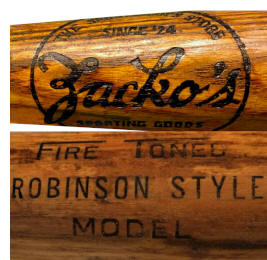 Zako's Sorting Goods was established by
Joseph C. Zacko in 1924, at 305-307
North Third Street, Pottsville,
Pennsylvania. Joe, known as the "Fox"
in both NFL and major league baseball
circles, was formerly a scout with both
the New York Yankees and Boston Red
Sox.
Zako's Sorting Goods was established by
Joseph C. Zacko in 1924, at 305-307
North Third Street, Pottsville,
Pennsylvania. Joe, known as the "Fox"
in both NFL and major league baseball
circles, was formerly a scout with both
the New York Yankees and Boston Red
Sox.
Zacko was inducted into the prestigious Pennsylvania Sports Hall of Fame
in 1971 for his countless contributions
to Schuylkill County's sports scene.
The
"Zacko's Sporting Goods"
center-brand reads across the top: "The
Sportsman's Store Since '24." Known
block letter last name endorsement
models include this "Fire Toned"
Robinson Style Model, most likely
playing off Jackie Robinson's
popularity, loosely dating the bat to
the 1950s. Zacko's Sporting Goods
closed in 1973.
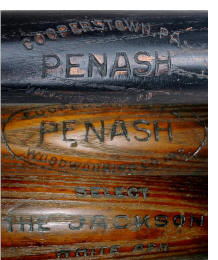 During the 1930s, Fred Mitchell, then a
rural mail carrier, became interested
in the hobby of a friend, Rev.
McPheters, who carved baseball bats
with an air of perfection. The minister
taught the young mail carrier all he
knew about the art and Mitchell
continued his newly-found hobby
throughout the early 1930's, turning
them out at home on a hand lathe, and
giving away the bats he didn't sell.
During the 1930s, Fred Mitchell, then a
rural mail carrier, became interested
in the hobby of a friend, Rev.
McPheters, who carved baseball bats
with an air of perfection. The minister
taught the young mail carrier all he
knew about the art and Mitchell
continued his newly-found hobby
throughout the early 1930's, turning
them out at home on a hand lathe, and
giving away the bats he didn't sell.
Following the end of the war a neighbor boy, Don Wood, returning from the
service joined Mitchell in an attempt
to start up the small business.
Using the
trade name Penash, the men
planned to make three grades of bats
and a junior size. Mitchell bought out
the other investors in 1956. For many
years he sold bats for $1.00; seconds
for 50 cents. He also made miniature bats for the youngsters.
William Walter Pollock (1886-1970) owned and operated the Hohenwald Bat
Company in Hohenwald, Tennessee. He had
a couple lathes in a shed behind his
home at 100 S. Walnut where he would
turn the bats on. It was a very small,
rustic operation as the shed also
served as a Smoke House to cure hams.
He made the bats in various lengths. |
|
| |
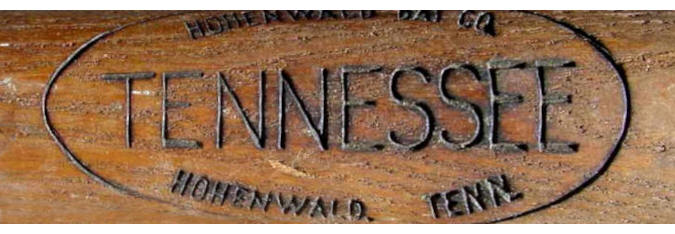 |
|
| |
Pollock made little league and
regular size bats. He gave away some of
the smaller bats to kids. The A & B
Hardware store in Hohenwald, sold his
bats, and some of the regular size bats
were bought by the baseball team in
Nashville. The baseball bat oval
branding reads:
"Hohenwald Bat Co." above
"Tennessee' and "Hohenwald. Tenn."
below. Some bats have "W.W. Pollock"
stamped between "Tennessee" and
"Hohenwald. Tenn."
 The
S & H Wood Products baseball bat
company was located at the former
Daniels Mill Work plant, at 900 Monroe Street
in Jamestown, New York, from 1960 to 1962.
The
S & H Wood Products baseball bat
company was located at the former
Daniels Mill Work plant, at 900 Monroe Street
in Jamestown, New York, from 1960 to 1962.
Jamestown businessman Littner “Sody”
Soderstrom, and Tommy Henrich, former
New
York Yankee star, formed the
baseball bat company in 1959.
Soderstrom was listed as the president
and Henrich as vice-president.
The bat handles had a new wood-treating process said
to have a life expectancy of about
twice that of the baseball bats in use. An experimental model was used by several major leaguers
such
as Jackie Jensen, Harvey Kueen, Al Kaline, Joe DeMaestro, Hal Smith, Gene
Woodling, Pete Reynolds, Frank House
and Roger Maris used it during the 1959
season.
It appears that Soderstrom and Henrich were unsuccessful with their
business plan, as there are no records
after 1962. The only model produced was
the Smash Hit 400. There was also a
J.W. Edwards Smash Hit 400 little
League bat made in Girard, PA with the
same branding.
In 1928, Hollis Tull, and his brother, Lee was trapping animals in
Tennessee, when he came upon a man cutting
ash lumber for baseball bats. Lee
realized he knew where there was a
quantity of ash trees. He learned the
name of the company the man was selling
his bat blanks to, Hillerich & Bradsby
Co., of Louisville, Ky. |
|
| |
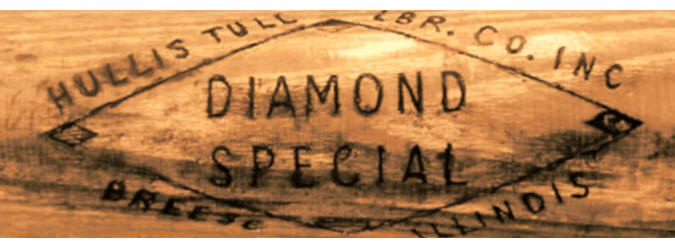
|
|
| |
Lee contacted the company, makers of
the Louisville Slugger, and secured a
contract to sell them some baseball bat
blanks. Brothers Henry, and Hollis,
joined Lee in this new venture. Lee and
Henry left the business to devote more
time to farming, leaving Hollis to run
the company by himself.
The company now located in Breese Illinois, purchased three lathes, and a trademark
"Diamond Special" branding was designed for the
bats. In 1969 the company produce
approximately 500 bats per day. At
first, they made bats for Little
League. They also made larger bats for
high schools and adult leagues. The
bats
were made available wholesale for $2.00 to
$2.50. Retail price was a dollar or
more higher. In 1974 the bat making
equipment was sold to the Worth Bat
Company of Tullahoma, Tenn. |
|
| |
|
|
| |
Also Read:
Lesser-Known and Privately Branded
Baseball Bat Labels Part I
Lesser-Known and Privately Branded
Baseball Bat Labels Part II
Lesser-Known and Privately Branded
Baseball Bat Labels Part III
Lesser-Known and Privately Branded
Baseball Bat Labels Part IV |
|
| |
|
|
| |
KEYMAN COLLECTIBLES
RELATED RESOURCES |
|
| |
|
|
| |
KeyMan
Collectibles Collectors Corner
- Keep up with the latest collecting news,
announcements, and articles of interest on the
webs best resource for baseball memorabilia. |
|
| |
KeyMan Collectibles Baseball
Memorabilia Facebook Group -
Post Questions and comments relating to
Baseball Collectibles and Memorabilia. Interact
with other collectors or show off your
collection. |
|
| |
KeyMan Collectibles Forum
- A great option for those that "Don't do
facebook" Post Questions and
comments relating to Baseball Collectibles and
Memorabilia |
|
|


